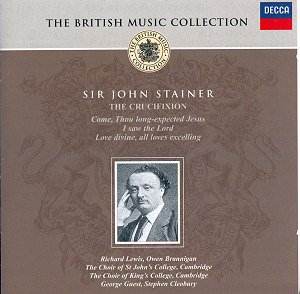The Crucifixion is well over a century old now Ė first
performed at St Marylebone Parish Church in 1887 Ė and shows no sign
of relaxing its hold on the catalogue. Predominately this is because
Stainerís greatest gift is to have written a relatively easy-to-perform
work for limited forces and ones moreover specifically related to a
parish choir. Its emotional circumspection and lyrico-dramatic limitations
(in a conventional sense) are wholly in keeping with this ethos. Its
linear progress is unhurried and unvisited by directly expressive intrusions
though Fling wide the gates has long been valued as a rousing
and welcomingly evocative moment. Elsewhere the faux conversationality
of the recitative He made Himself of no reputation will strike
many as forlornly ineffectual and the jaunty choral hymn For the
love of Jesus following Christís death on the Cross as a woefully
inadequate response.
But this is, I suppose, to ascribe to the work the
kind of qualities and depths to which it does not, of itself, aspire.
It does possess a musical integrity of its own, a very Victorian sense
of fulfilment and the audience or congregational hymns do indeed embrace
a degree of intimacy and involvement hard to gainsay. All of which perhaps
sounds equivocal about the work and it must be said that the level of
musical insight is not uniform, that the melodic contours can seem prosaic,
that the sensibility of the whole piece emerges as rather too comfortable
and confined. Still in a performance of conviction such problems can
at least be minimised and mitigated. And if you canít listen to Richard
Crooks and Lawrence Tibbett in it (and actually you can or could until
recently on Claremont) then Richard Lewis and Owen Brannigan from 1961
are the next best thing Ė maybe even the better thing. Lewisís deeply
sensitive tenor elucidates the text as few ever could, with his characteristic
elegance and beauty of tone Ė not, itís true, with the plangency of
his predecessor, the greatest of all British lyric tenors, Heddle Nash,
one of whose BBC broadcasts of The Crucifixion has survived Ė
but with real engagement. Redoubtable Owen Brannigan is moving and commanding,
flexible of voice, sonorous but not over inflated. The Choral Hymns
are taken by the Choir of St Johnís conducted by George Guest. The directness
and uncomplicated simplicity are worthily apposite to the work which,
at over an hourís length, still requires intelligence of pacing and
an undragging approach. The sound quality was always good and it emerges
so still. Short of hearing Nash, with his son, John Heddle, this Decca
disc is The Crucifixion that, it seems to me, most appropriately
and honestly gets to grips with its complaisant aesthetic. If that sounds
backhanded it is still intended to convey that the work still has the
power to move.
Three hymns complete the disc, dating variously from
1958, 1963 and 1985 - inappropriately heterogeneous chronologically,
perhaps, but appositely prayerful. For all its faults, for all its frustrating
limitations, for all its tonal and musical inadequacies there is nevertheless
something touching in its assured reverence that will ensure that The
Crucifixion keeps its place in the repertory and its secure place
on disc.
Jonathan Woolf


